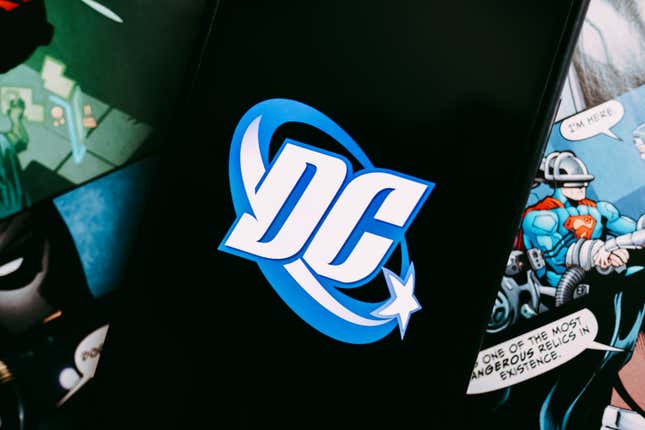
You know, I thought Batman v Superman: Dawn of Justice would remain the most offensive thing DC Comics would ever do, but alas, I was wrong. Two former Black comics editors have revealed they experienced multiple instances of racial discrimination during their time at the legendary comics publisher.
In an interview with Business Insider, Harvey Richards and Lateef Ade “L.A.” Williams revealed that despite having different career paths, they both feel that they never got the chance to fully succeed at DC, due to their race. Williams left DC in 2000 after six years with no promotion, and Richards was fired in December 2019, after spending nearly 22 years with the company.
DC Comics, for those unaware, is the home of Batman, Superman, Wonder Woman, and basically all the superheroes that mattered well before the Marvel boom.
Richards was the only Black person on the editorial staff when he was fired last year. He felt his career at DC Comics was hampered, receiving only one promotion during his two decades at the company. While taking a different path, Williams felt his story was remarkably similar to Richards’.
“My personality and work style is different than Harvey’s, who is different from every other name I could rattle off,” Williams told Business Insider. “But no matter how different our work styles or personalities are, the reality is that every one of our stories ended up the same. When it keeps happening year after year, person after person, you have to ask yourself what all of these people have in common.”
A Latina writer told Business Insider that she left DC Comics in 1999 after experiencing a similar lack of career advancement and feeling like she was undervalued in the company. The traditional career track in comics editing goes assistant editor, associate editor, editor, group editor, and executive editor.
The editing team is kind of like a producer on a movie; they interface with each department to make sure the best version of each book makes it to comics shelves every week, as well as help to shape the vision for the characters as they move forward.
Both Williams and Richards say they experienced unfair treatment from management and felt they were treated differently because of their race.
From Business Insider:
In 2001, after four years as an assistant editor, Richards was offered the chance to work on the Superman titles. It wouldn’t have been a promotion, but a chance to prove himself (the chain generally went like this: assistant editor, associate editor, editor, group editor, and executive editor).
But Richards was given what he said was the “unusual” task to write about what he “could bring to the Superman books.” Paul Levitz, then the EVP and publisher of DC, told Richards he had “grammar problems” after he completed the assignment, Richards said.
“After that, Levitz made up his mind about me,” Richards said. “I felt he already had because most people are promoted after four years. But after that, it was over, even if I got a good review or worked on good projects or got company awards for going above and beyond.”
Richards won two such awards, called “Carrots,” which were given by DC’s parent company, Warner Bros. After he won the second time, Levitz handed it to him and said “some people think you deserve this,” Richards said.
Personally, I feel like white executives have mastered the art of dropping the Hard-R without ever actually calling you the N-word.
Richards found out he was fired upon returning to work after Thanksgiving break last year only to be told he “no longer met company standards” and was given six months severance. Richards provided Business Insider with a document putting him on zero-tolerance probation last August alleging “poor time management skills and an inability to meet deadlines.” Richards said he was being overworked.
I’ve seen many a comic continually delayed by Big Name (White) Writers with little professional consequence; just saying.
Williams faced a similar experience with his higher-ups during his time with the company in the ‘90s. Williams and his fellow assistant editors were given books to edit that were doomed to fail. Then-executive editor Mike Carlin, now a DC Entertainment creative director, was reportedly upset when the book assigned to Williams, Impulse, wound up being a success.
Williams says that Carlin cursed him out for using veteran artist Walt Simonson to draw two issues of the comic, feeling that his talent would better be used on Superman books. Eventually, after an associate editor left the company, Williams was put in charge of his books.
“I thanked him for my promotion,” Williams said. “And he interrupted me and said it didn’t come with a promotion. I feel so stupid now, but at the time I was so confused and asked why it wouldn’t come with a promotion.”
You know, this is fitting behavior from a company whose crown jewel, Batman, is the embodiment of white privilege.
“I naively thought that as long as I do good work, the comics sell, and the critics like them, I’m going to do well,” Williams told Business Insider. “As a Black man in America, I knew I wouldn’t be able to make as many mistakes as others. But I thought the solution was, work harder and do better.”
Both hope that the recent restructuring of DC Comics will allow more marginalized voices to rise up the editorial path. Richards noted that he would like to see more Black women in the editorial field.
“Change is going to come,” Richards told Insider. “It has to.”



